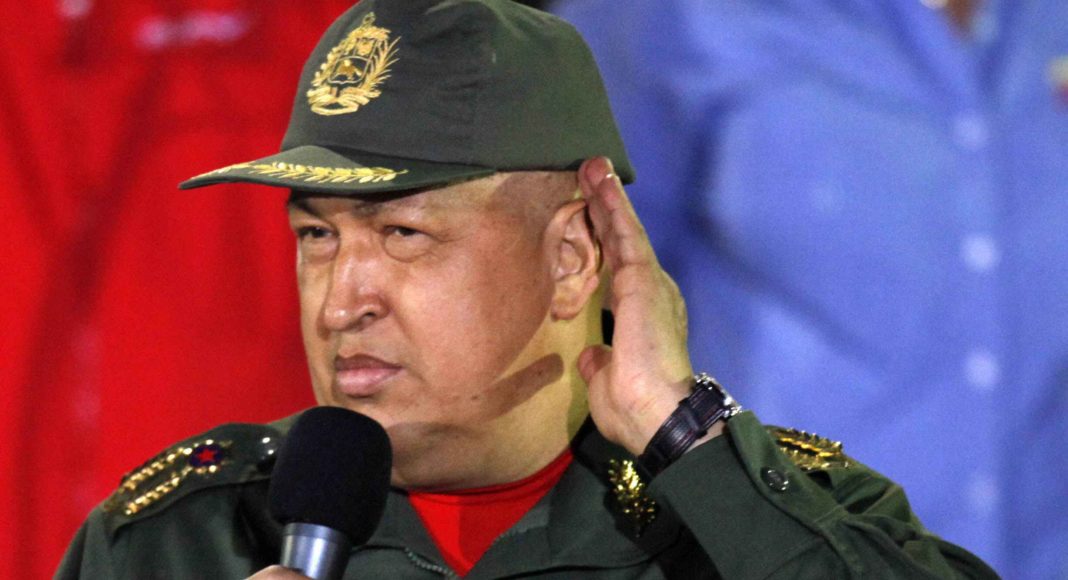 On Sunday 9th December, Venezuelan president Hugo Chávez announced that his cancer had returned and that he needed to immediately depart for Cuba for surgery. Since his diagnosis for an unspecified form of cancer in June 2011, Chávez has been to Cuba for treatment on three separate occasions.
On Sunday 9th December, Venezuelan president Hugo Chávez announced that his cancer had returned and that he needed to immediately depart for Cuba for surgery. Since his diagnosis for an unspecified form of cancer in June 2011, Chávez has been to Cuba for treatment on three separate occasions.
But Sunday’s speech was an emotional address. It was distinct from previous post operative statements from the president in that Chávez urged his supporters to vote for vice-president Nicolas Maduro in the event new presidential elections have to be convened.
This was the first time that Chávez has directly indicated his preferred successor, hinted at the possibility that his tenure is finite and sought to guide the transition to a post-Chávez landscape. For these reasons, observers are coming to the conclusion that we are now approaching the end of the Chávez era. The PSUV and Chávez supporters are reeling from the evident downturn in the President’s health. Prayers for Chávez have been called this Sunday in a diversity of global locations. Constitutionally, Chávez’s grave illness comes at a complex time, with his absence falling between the end and beginning of presidential terms.
Chávez had announced in May that he was cancer free before throwing himself into the presidential election contest that he won in October by an 11% margin over the opposition alliance candidate Henrique Capriles Radonski. But the stability provided by the majority vote for Chávez in October has proved short-lived. Either by choice or by necessity, it is not now expected that Chávez will make the January 10th inauguration of his third term.
Chávez has only requested from the National Assembly a five day period of absence. The Constitution does permit the president a period of absence up to 90 days renewable by the National Assembly, during which Chávez will be substituted by the vice president – Nicolas Maduro.
But if the president is forced to stand down within the first four of a six year term, new presidential elections are required within a 30 day period. After four years in office, the president can be replaced by his vice-president to see the remainder of the term through. Sadly, there appears to be little confidence that Chávez can begin, let alone see through, those first four years to 2017.
The opposition MUD alliance has sought to capitalize on a potential constitutional dilemma and vacuum of power, even though their position goes against majority sentiment among an emotive Venezuelan population. Senior MUD figures have called into question the authority of newly appointed ministers that have yet to be sworn into office, while in the National Assembly MUD figures such as Maria Corina Machado have called for new presidential elections on the basis that Chávez’s absence is likely to be permanent rather than temporary.
The MUD is pursuing a dangerous strategy. While on the one hand they are seeking to present themselves as a stabilizing alternative, they run the risk of framing themselves as brutally unsympathetic to an individual anda family tragedy. Given the groundswell of support for Chávez in the October election, the MUD appears to be chronically misreading popular sentiment. But misreading public opinion has been a long term habit of the opposition.
As for Nicolas Maduro, the former bus driver turned union leader who now serves as foreign minister, he has to step up to major responsibilities. A genial individual who has been a long term and close ally of Chávez , Maduro is more popular among the grassroots than other potential Chávez successors, and he carries with him the legitimacy among the ruling PSUV hierarchy of being directly favored by Chávez. There are no poll surveys that indicate how well he would fare in a presidential election but, in the event such a contest coming quickly, he will benefit from the ‘Chávez effect’ and no doubt a sympathy vote.
Much depends on who Maduro may find himself standing against. Capriles was roundly defeated in October despite intensely favorable press coverage in Venezuela and overseas. Sunday 16th December brings elections for the country’s 22 state governors and hundreds of local mayors. After October’s failure to win the presidency, Capriles has fallen back on defending his position as state governor of Venezuela’s most popular state Miranda. But polls show he faces intense competition from Chávez’s former vice president Elias Jaua. A second defeat would be catastrophic for Capriles. It would inevitably push him and the moderate centrist opposition parties that he represents to the fringes of the MUD alliance. The question of who might step in to replace him as the MUD candidate remains oblique, particularly in the context of the MUD facing a possible collapse in its vote on the 16th as an electorate sympathetic to an ailing president moves decisively behind the PSUV.
Venezuela has reached a defining moment. Events over the next week will indicate in which direction the country is heading – a direction determined on the one hand by the ballot box, or on the other hand, and more ominously – by Chávez ‘s medical team in Havana.

